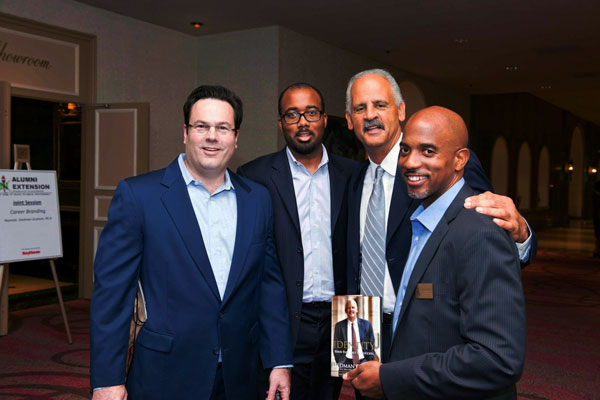Doing the same things, the same ways, has predictable results. Sometimes it is important to do things differently.
Here is a photo of me at the National Society of Black Engineers' Professional Development Conference, where I had the opportunity to present and participate in several panel discussions.

That is me, the Mitchell brothers, and Steadman Graham
I'm neither black, nor an engineer, and they aren't traders; so why would they ask me to present… and why would I say yes?
Value is often added at the edges. Likewise, good things often happen when you travel outside your comfort or habit zone.
I gained a lot from the experience. For example, I had a discussion with the nuclear physicist who talked about how they use computer simulations to model the effects of a nuclear explosion. That gave me great ideas about how to measure the effect of a particular trading system or algorithm on a market.
Luck does favor the prepared. That conversation could just as easily have been me simply saying 'hello,' shaking hands, and moving on to the next person. To some extent, the ability to take advantage of opportunities comes from the intent to find them.
Is Luck Something That You Can Maximize, Or Would You Consider It Random?
It's possible that luck is both random and something you can maximize.
 Here is an example. Many people consider the stock market to be random. Nonetheless, there
Here is an example. Many people consider the stock market to be random. Nonetheless, there
are groups of people who consistently beat the market and trade
profitably. How is that possible?
To explain, let's examine the
decision to purchase Apple Computer stock. Regardless of whether that
decision was based on gut instinct, fundamental analysis,
or a technical chart pattern … whether price moves up or down the
moment after that purchase is for the most part random.
However, if you
make 10,000 trades over time, then your ability to make and keep money is about how you manage risk and opportunity. At that point, your
system is not necessarily random. Consequently, it is something that you can
improve.
Transform Results By Getting Un-Stuck.
Improvement means getting better and different results. And, as you already know, it doesn't make sense to continue to do the same thing, yet to expect different results. So, a key skill is learning to recognize when things are "stuck" in rut.
The trouble with many "ruts" is that you don't know you're in one, while you're in one. Consequently, it often takes a different perspective to become aware of new possibilities, opportunities, or best next steps.
Implications.
The interesting thing that this implies is that those opportunities were always there … they just weren't there for you in your current state of awareness.
Similarly, recognize that many of the processes that we rely-on limit our "luck" or opportunities precisely because they limit our choices. When this is done consciously it can be helpful. However, when it's an unconscious act, it can be dangerous.
In general, you can categorize many tools as either being multipliers or diminishers. Neither one is good or bad in and of itself. The trick is to recognize that you have a choice, and that not choosing is still a choice.

